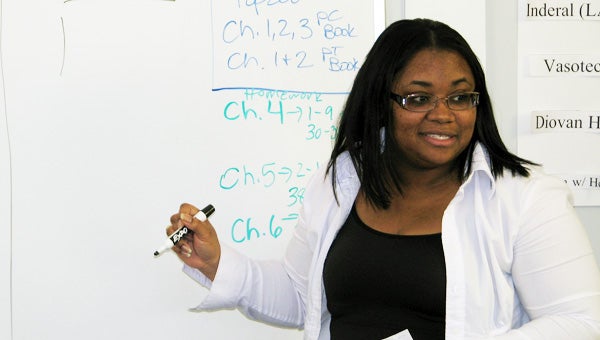‘We make it accessible’
Published 9:42 pm Saturday, January 26, 2013

Teaching: LaKeisha Goode drills her pharmacy technician class on the 200 most commonly prescribed medications during a recent session. She took the responsibility for the class on herself after funding through a regional organization dried up.
Women offer unusual approach to job training
Raquel Harris and LaKeisha Goode aren’t your ordinary continuing-education teachers.
“We are, I guess you could say, non-traditional,” Goode admitted. “On graduation day, it is the best feeling. I know all the nights I stayed up until 2 or 3 in the morning, it made a difference.”
The two women taught medical training classes for the Southeastern Tidewater Opportunity Project when it operated from a Tynes Street building. But when the organization’s funding for the program dried up in 2010, it left the community with one less option to kick-start a viable career.
Raquel Harris, who had taught for STOP for several years, couldn’t tolerate that.
“It was important, because this community doesn’t have a lot of resources,” Harris said. “I saw a need, and I wanted to be able to fulfill that need.”
Harris already was operating some classes separately out of an East Washington Street building. She knew an expansion was needed to fill the void STOP had left.
The registered nurse moved her company, HealthCare Services 101, to the Tynes Street building vacated by STOP. She added more classes, now offering training for certified nurse aide, medication aide, personal care aide and CPR.
She holds her students to high standards, even requiring them to pass the class with a higher percentage than the state requires.
“I don’t want an average caregiver taking care of me or my mother,” she told a recent class full of certified nurse aide candidates. And she encourages them not to stop at nurse aide — one former student will soon begin nurse practitioner training.
“A lot of nurses started out as CNAs,” she said. “It gives you a foundation you can build on.”
The expectations for attendance are also high. Can’t get a ride? She’ll pick you up and take you home. Babysitter got sick? Bring the baby to class.
“A lot of these students don’t use their maximum potential, because they don’t get the assistance they need,” she said. “I was one of those students who brought my son with me to class. I think it’s only right to do something for someone else that was done for you.”
Last year, Harris joined forces with LaKeisha Goode, also a former instructor for STOP. Goode wanted to continue offering pharmacy technician training to the Suffolk community.
Still a full-time pharmacist at Farm Fresh on North Main Street, Goode took on the additional responsibility of starting her own business. She formed Medical Training of Virginia and started the first class in September, which graduated in December. Six of those graduates already have taken their national boards, and five have passed, she said.
She’s every bit the stickler for attendance that Harris is.
“You bring the toys, you bring the snacks, you bring the baby and you come to class,” she said. “I pick them up; I take them home. I do it because I know they can’t afford to go somewhere else.”
The classes offered are inexpensive compared to other area programs — for example, $1,200 for the pharmacy technician class, which includes books and the national board exam, and only $680 for the CNA class.
“I wanted it to be affordable,” Harris said. “If this is what you really want to do, we make it accessible.”
For Goode, the reward came on her first graduation day in December.
“It’s a lot of work, but graduation day made it worth it,” she said.






